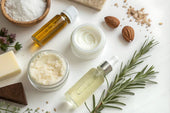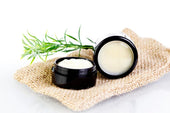Is Coconut Oil Good for Skin or Just a Beauty Trend?

Share
Coconut oil isn’t just sitting in your kitchen anymore - it’s stealing the spotlight in the beauty industry! From moisturisers and cleansers to lip balms and DIY masks, this tropical staple has become a global skincare crush. But, sometimes you may think; Is it actually a skin savior, or just another overhyped fad?
Let’s peel back the layers, like cracking open a coconut to explore the science, the benefits, the possible downsides, and the smartest ways to use coconut oil in your skin routine. Find out if it really deserves that prime spot on your skincare shelf!
Coconut oil is not all about pretty packaging, it is enriched with goodies that genuinely can help your skin. Here’s what inside:
- Lauric Acid – This little powerhouse fights bacteria that can cause acne.
- Caprylic & Capric Acid – Soothe irritation and calm inflammation.
- Vitamin E – A classic antioxidant that helps protect your skin from damage.
- Fatty Acids – Lock in moisture so your skin stays soft and smooth.
What Makes Coconut Oil So Popular?
Why has this tropical oil captured so much attention? Its natural appeal makes it so popular as people are moving away from harsh chemicals, due to their side effects and opting for natural, or organic skincare products. Coconut oil is a multi-use magic. From moisturiser to makeup remover and hair treatment, you name it, coconut oil does it all. One jar, many possibilities. When your favorite celeb starts raving about it, you know it's bound to trend. But here’s the thing — hype is easy. What’s really inside this jar that makes it so special?
Some Real Benefits of Coconut Oil for your Skin
Don’t think that coconut oil is for cooking only, It has a great impact on the skin. Whether its pigmentation, dark spots, uneven tone, or temporary marks, it takes care of all the stuff. Yes, but it takes a lot of time to heal, when you use it as a treatment, because of its natural and soft healing properties. This oil is a multitasking wonder that can do a lot for your skin!
- Deep Hydration & Elasticity: Coconut oil is known for its emollient properties, which can help in improving hydration and reduce dryness. Think of coconut oil as a cozy blanket for your skin. It locks in moisture, forming a protective barrier to prevent water loss. Perfect for dry, flaky patches or eczema-prone areas.
- Natural Antimicrobial Protection: Thanks to lauric acid, coconut oil can help fight off bacteria and fungi, keeping your skin feeling clean and healthy.
- Soothes Irritation: Redness, itching, or mild irritation? Coconut oil’s anti-inflammatory properties can calm and comfort sensitive skin naturally.
- Wound Healing Support: Some research suggests coconut oil can accelerate wound healing like minor cuts, by increasing collagen production and improving the skin’s ability to regenerate. support collagen production, helping minor cuts and scrapes heal faster.
Versatility at its best! The coconut oil is more than a hydration. It doubles as a makeup remover, body oil, lip balm, or even a cuticle softener. The benefits are real, but there are some downsides you should know about.
Cons of Coconut Oil
- Highly comedogenic: It can clog pores, especially if your skin is oily or acne-prone.
- Not for every skin type: Sensitive or reactive skin might find it too heavy, leading to irritation.
-
Too rich for the face: It’s thick texture can feel heavy on the face.
Who Should Use Coconut Oil?
Coconut oil is best for dry, normal, or eczema-prone-skin mostly on the body. But, yes, it can be used on the face. We recommend using coconut oil on your face at night. If you have a combination or sensitive skin, use caution. Avoid it, if you have oily or acne-prone skin as it may trigger break-outs.
The coconut oil has higher benefits as compared to its downsides, and its usage completely depends on your skin type. For dry or normal skin, it can do wonders, and helps you in maintaining a healthy skin for a long term.
Smart Ways to Use Coconut Oil
- Moisturiser: Apply a small amount to damp skin before bed time to lock in hydration all night long.
- Lip Balm: A dab of coconut oil keeps the lip soft and hydrated, if you feel it's too heavy, clean with the wet cotton, and it's all hydrated lips.
- Makeup Remover: Massage onto your face to dissolve makeup, then wash off with a gentle cleanser.
- Dry Hands & Feet: Massage into cuticles or cracked heels before bed for overnight healing.
- DIY Skincare: Mix with sugar for a natural scrub or with honey for a soothing mask.
Tips for Safe Use: Use cold-pressed, unrefined coconut oil and always try a patch test first. Use in moderation, and if you are using it as a makeup remover, make sure to wash your face afterwards to avoid clogged pores.
Coconut oil is all about balance. It works wonders for dry, eczema-prone or normal skin but could cause issues for oily or acne-prone skin. Not a miracle cure, but definitely not just a hype as well!
Final Thoughts
Coconut oil has earned its spot in the beauty world for good reason — but it’s not a one-size-fits-all solution. Understanding your skin’s unique needs is key.
If it hydrates, nourishes, and leaves you glowing, coconut oil could be your budget-friendly natural beauty buddy. If not, there are plenty of other oils out there that might suit you better.
At the end of the day, glowing skin isn’t about following every trend — it’s about finding what truly works for you.
 is here! Shop now, pay later in 4 easy installments
is here! Shop now, pay later in 4 easy installments



























